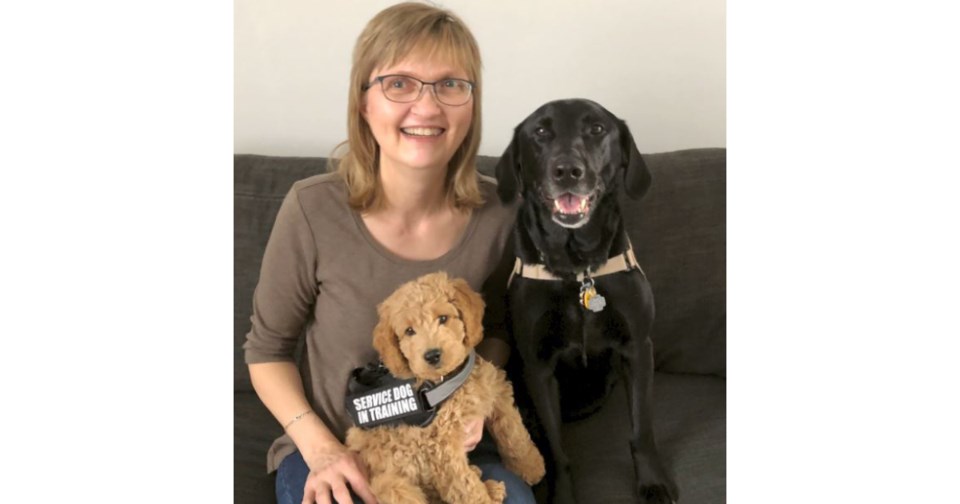HUMBOLDT ŌĆö Gail Maki was 12 years old when she was first diagnosed with Type 1 diabetes.
That was 43 years ago. Over time, Maki stopped feeling the highs and lows associated with her blood sugar levels. This was a problem that could have had dangerous health repercussions for her.
Thankfully there was a solution, and that solution was named Echo. Echo is MakiŌĆÖs seven-year-old diabetic alert service dog.
ŌĆ£She will either give me a paw or come up a nudge me and sheŌĆÖs telling me, ŌĆśWe need to check because the sugars arenŌĆÖt where they should be,ŌĆÖŌĆØ Maki said. ŌĆ£She can tell if theyŌĆÖre high or low because sheŌĆÖs that much further ahead than the glucose meter ... They can smell so much more than we can.ŌĆØ
A diabetic alert service dog like Echo can detect problems up to an hour before the blood glucose meter is able to.
While Echo gets lots of pats and affection when home with Maki, in public Echo has an important job to do. This is signalled through the service dog vest she wears, which tells people not to distract or pet her.
ŌĆ£For every service dog it is the same,ŌĆØ Maki said. ŌĆ£So many people donŌĆÖt realize that diabetes is considered an invisible disability, right? If you saw somebody with a seeing eye dog, you probably wouldnŌĆÖt go up to that dog and touch it, right? Just for the simple reasons of, ŌĆśOh I shouldnŌĆÖt distract that dog, because that person is blind.ŌĆÖŌĆØ
If Echo is distracted, thereŌĆÖs a chance she could miss an important moment of alerting Maki.
ŌĆ£There are a lot more invisible disabilities out there, I mean, weŌĆÖre hearing more about the diabetic alert service dog, the PTSD [post traumatic stress disorder] dog. So whenever you see a dog with a vest, donŌĆÖt talk to it.ŌĆØ
When the vest comes off, it means Echo can receive attention again. But her job is really never done.
ŌĆ£SheŌĆÖs working 24/7,ŌĆØ Maki said. Shortly after saying this, Echo alerted Maki with a whine that she should check her glucose levels.
Maki said on average the cost to get a service dog, like Echo, is about $25,000.
ŌĆ£When I got her that included the cost of the dog, the training and all that. But that was US funds, $25,000 US, so it cost me a bit more.ŌĆØ
Service dogs only work for nine to 10 years, at which point they can retire and become a household pet. Echo is seven.
ŌĆ£The median lifespan of a medium-sized dog is 10 to 12 years. So retiring on the lower end of the life expectancy makes sense. When Echo retires she'll have the time to relax, as with people. Though, she may choose to continue to work.ŌĆØ
Filling EchoŌĆÖs role will be a puppy named Merlin.
┬ĀŌĆ£I had a fundraiser here to help raise funds for a new service dog, and we managed to raise enough to pay for the dog itself,ŌĆØ Maki said. ŌĆ£So IŌĆÖll have to pay for the training. IŌĆÖm going to go through a different route. One of the trainers who trained Echo and me ŌĆō he branched out on his own and has his own training now. HeŌĆÖs actually training me and my new puppy.ŌĆØ
The training starts with basic obedience and will go on for two years, with Echo helping to mentor.
ŌĆ£You have to start somewhere and building on all this. And in two years, when Echo retires, this little one should be ready to take over.ŌĆØ
The fundraiser for Merlin, a steak night and silent auction, was set up by three women Maki works with.
ŌĆ£It was an informative evening,ŌĆØ Maki said. ŌĆ£My trainer was able to Facetime with us and answer any questions that people had, and just talked a little bit about what would be happening and things like that.ŌĆØ
While it was a success, Maki doesnŌĆÖt feel comfortable holding another fundraiser for the training, which will cost her about US$10,000.
ŌĆ£WeŌĆÖre trying to do it as much as we can on our own,ŌĆØ she said.
Merlin will have an important job to do and big paws to fill, but right now heŌĆÖs a puppy like any other.┬Ā┬Ā┬Ā┬Ā┬Ā
ŌĆ£We got the puppy biting, the puppy excitement, the whole bit, right? The crate training, the potty training. WeŌĆÖre all as a family invested in this and having to be really committed to get to where we want to be. So itŌĆÖs daily work.ŌĆØ
When MerlinŌĆÖs training is finished, he can take over EchoŌĆÖs place and Echo can finally get all the head pats and scratches she wants.
Maki doesnŌĆÖt think she can put into words what Echo means to her.
ŌĆ£SheŌĆÖs part of me, and IŌĆÖm part of her,ŌĆØ Maki said. ŌĆ£You donŌĆÖt realize how much you each depend on each other. I can totally trust her, totally trust her. WeŌĆÖre a team.ŌĆØ




